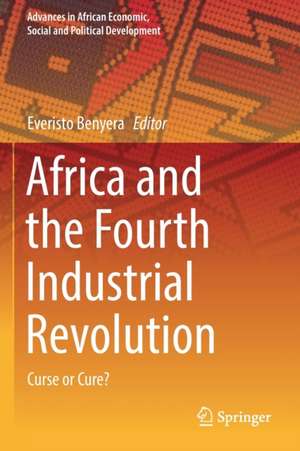Africa and the Fourth Industrial Revolution: Curse or Cure?: Advances in African Economic, Social and Political Development
Editat de Everisto Benyeraen Limba Engleză Paperback – 11 noi 2022
| Toate formatele și edițiile | Preț | Express |
|---|---|---|
| Paperback (1) | 720.70 lei 43-57 zile | |
| Springer International Publishing – 11 noi 2022 | 720.70 lei 43-57 zile | |
| Hardback (1) | 726.55 lei 43-57 zile | |
| Springer International Publishing – 10 noi 2021 | 726.55 lei 43-57 zile |
Din seria Advances in African Economic, Social and Political Development
- 20%
 Preț: 562.78 lei
Preț: 562.78 lei - 18%
 Preț: 781.45 lei
Preț: 781.45 lei - 15%
 Preț: 648.56 lei
Preț: 648.56 lei - 15%
 Preț: 704.36 lei
Preț: 704.36 lei - 15%
 Preț: 640.71 lei
Preț: 640.71 lei - 15%
 Preț: 645.47 lei
Preț: 645.47 lei - 20%
 Preț: 552.24 lei
Preț: 552.24 lei - 18%
 Preț: 785.24 lei
Preț: 785.24 lei - 24%
 Preț: 694.97 lei
Preț: 694.97 lei - 15%
 Preț: 636.30 lei
Preț: 636.30 lei - 15%
 Preț: 647.08 lei
Preț: 647.08 lei - 18%
 Preț: 729.23 lei
Preț: 729.23 lei - 18%
 Preț: 891.33 lei
Preț: 891.33 lei - 18%
 Preț: 892.90 lei
Preț: 892.90 lei - 15%
 Preț: 654.43 lei
Preț: 654.43 lei -
 Preț: 391.40 lei
Preț: 391.40 lei - 15%
 Preț: 698.30 lei
Preț: 698.30 lei -
 Preț: 391.61 lei
Preț: 391.61 lei - 15%
 Preț: 642.68 lei
Preț: 642.68 lei - 18%
 Preț: 788.41 lei
Preț: 788.41 lei - 15%
 Preț: 584.43 lei
Preț: 584.43 lei - 15%
 Preț: 644.30 lei
Preț: 644.30 lei - 15%
 Preț: 642.51 lei
Preț: 642.51 lei -
 Preț: 389.88 lei
Preț: 389.88 lei -
 Preț: 432.88 lei
Preț: 432.88 lei - 15%
 Preț: 511.52 lei
Preț: 511.52 lei - 18%
 Preț: 995.83 lei
Preț: 995.83 lei - 18%
 Preț: 953.20 lei
Preț: 953.20 lei -
 Preț: 387.58 lei
Preț: 387.58 lei - 18%
 Preț: 894.34 lei
Preț: 894.34 lei - 15%
 Preț: 644.49 lei
Preț: 644.49 lei -
 Preț: 381.00 lei
Preț: 381.00 lei - 15%
 Preț: 698.62 lei
Preț: 698.62 lei - 15%
 Preț: 639.73 lei
Preț: 639.73 lei - 18%
 Preț: 897.65 lei
Preț: 897.65 lei - 15%
 Preț: 641.85 lei
Preț: 641.85 lei - 15%
 Preț: 644.95 lei
Preț: 644.95 lei -
 Preț: 392.37 lei
Preț: 392.37 lei
Preț: 720.70 lei
Preț vechi: 878.90 lei
-18% Nou
Puncte Express: 1081
Preț estimativ în valută:
137.93€ • 143.62$ • 116.56£
137.93€ • 143.62$ • 116.56£
Carte tipărită la comandă
Livrare economică 10-24 martie
Preluare comenzi: 021 569.72.76
Specificații
ISBN-13: 9783030875268
ISBN-10: 3030875261
Pagini: 158
Ilustrații: VIII, 158 p. 5 illus., 3 illus. in color.
Dimensiuni: 155 x 235 mm
Greutate: 0.25 kg
Ediția:1st ed. 2022
Editura: Springer International Publishing
Colecția Springer
Seria Advances in African Economic, Social and Political Development
Locul publicării:Cham, Switzerland
ISBN-10: 3030875261
Pagini: 158
Ilustrații: VIII, 158 p. 5 illus., 3 illus. in color.
Dimensiuni: 155 x 235 mm
Greutate: 0.25 kg
Ediția:1st ed. 2022
Editura: Springer International Publishing
Colecția Springer
Seria Advances in African Economic, Social and Political Development
Locul publicării:Cham, Switzerland
Cuprins
On the elusiveness of epistemic freedom in Africa and the need to unmask the colonial contract.- Race and Robotics: Black Theology in the Digital Age.- University 4.0: A Conceptual Model For South African Universities And The Fourth Industrial Revolution.- Against the grain: The tragedy of Zimbabwe in the context of 4IR.- Africa and the Fourth Industrial Revolution: Turning a Curse into a Resource through the Prism of Human Capital.- Rising to the Occasion: Africa, the 4th Industrial Revolution and Lessons from China.- Survival of African Governments in the Fourth Industrial Revolution.- The Fourth Industrial Revolution and Africa: A cure which kills the patient.
Notă biografică
Everisto Benyera is Associate Professor of African Politics in the Department of Political Sciences at the University of South Africa in Pretoria. He is Decolonial Reader and holds a M.Sc. in International Relations from the University of Zimbabwe and a Ph.D. in African Politics from the University of South Africa. He researches on transitology and transitional justice focusing on indigenous, traditional, and non-state reconciliation, peacebuilding, and healing mechanisms. He is Editor of the journal Politeia, Journal of Political Sciences and Public Administration and Management.
Textul de pe ultima copertă
This book examines the epistemological, political, and socio-economic consequences of the Fourth Industrial Revolution (4IR) for Africa. Presenting various case studies on epistemic freedom, theology, race and robotics, tertiary education, political and economic transformation, human capital, and governance, it debates whether the 4IR will be part of the solution to the African problem, namely that of coloniality in its various forms. Solving the African problem using the 4IR requires ethical, just and epistemologically independent leadership. However, the lack of ICT infrastructure militates against Africa’s endeavours to make the 4IR a problem-solving moment. To its credit, Africa possesses some of the major capital needed (human, mineral, and social), and it constitutes a huge market comprising a young population eager to participate in the 4IR as problem-solvers and not as a problem to be solved—as equal citizens and not as the marginalized other.
Caracteristici
Examines the epistemological, political, and socioeconomic consequences of the Fourth Industrial Revolution for Africa Presents various case studies on epistemic freedom, theology, race Highlights the economic and political transformation of Africa
